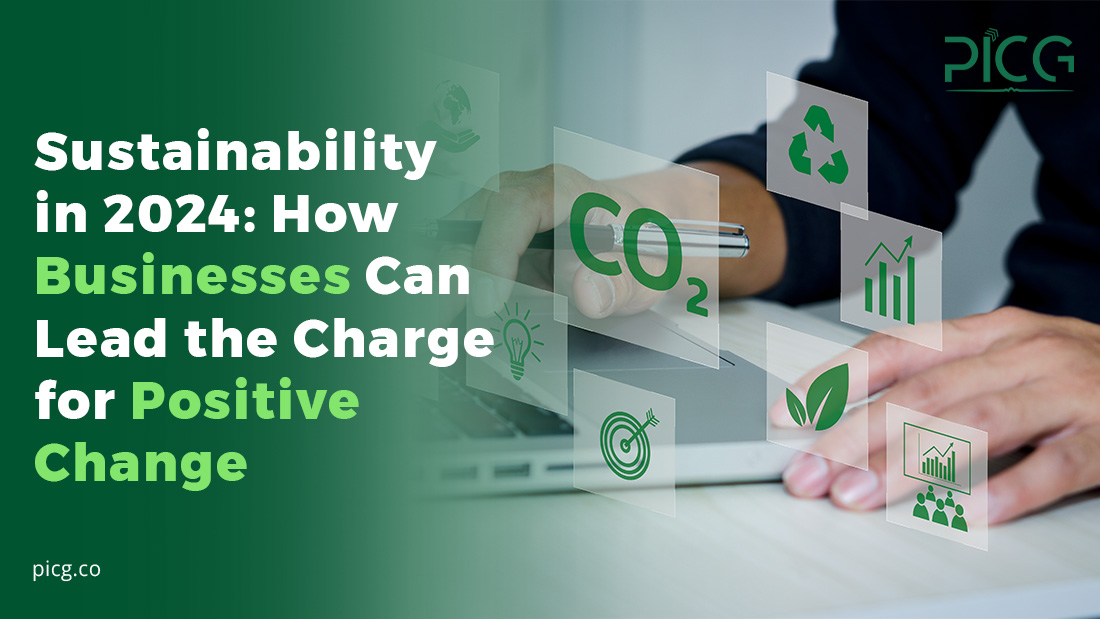


PICG

The concept of sustainability has become more than just a buzzword. As we step into 2024, the importance of businesses taking the lead in fostering positive change cannot be overstated. Let's explore how companies can embrace sustainability as a core principle and contribute to a greener and more socially responsible future.
Sustainability has transitioned from being a mere trend to a fundamental aspect of business operations. In 2024, consumers are more conscientious than ever, and they expect the companies they support to share their values. Businesses that acknowledge and act upon this shift are not only aligning themselves with consumer preferences but are also positioning themselves as leaders in their industries.
A key component of sustainability in 2024 is the adoption of circular practices. This involves minimizing waste by designing products that can be easily recycled or repurposed. Companies can also explore innovative business models such as product-as-a-service, encouraging a shift from ownership to access and reducing overall consumption.
Take the example of Patagonia, a renowned outdoor apparel company. Patagonia has implemented a Worn Wear program, promoting the repair and resale of used clothing. This initiative not only extends the lifespan of their products but also reduces the environmental impact associated with the fashion industry.
A truly sustainable business doesn't stop at its end product; it extends throughout the entire supply chain. Companies are increasingly recognizing the importance of sourcing materials responsibly and ensuring fair labor practices. This commitment to sustainability goes beyond mere compliance; it reflects a genuine dedication to ethical business practices.
An exemplary case is Unilever, a consumer goods giant committed to sustainability. Unilever has set ambitious goals for responsible sourcing of raw materials and has actively worked towards reducing its environmental footprint. By incorporating sustainability into its supply chain, Unilever not only meets consumer expectations but also sets a positive precedent for the industry.
In 2024, the push for renewable energy is stronger than ever. Businesses are expected to minimize their carbon footprint by adopting energy-efficient practices and investing in renewable resources. Transitioning to renewable energy sources not only benefits the environment but also proves to be economically viable in the long run.
Tech giant Apple has set an exemplary standard in this regard. The company is committed to powering all its operations with 100% renewable energy. From manufacturing to retail, Apple is making significant strides in reducing its environmental impact. By showcasing the feasibility of such practices on a large scale, Apple is inspiring other businesses to follow suit.
Building a sustainable business goes hand in hand with engaging stakeholders and fostering transparent communication. Companies need to involve their employees, customers, and communities in their sustainability journey. This not only strengthens the commitment to positive change but also builds trust and loyalty among stakeholders.
In the pursuit of sustainability, businesses must not overlook the well-being and diversity of their workforce. A sustainable company values its employees and recognizes the importance of a diverse and inclusive workplace. This not only aligns with ethical principles but also enhances creativity and innovation within the organization.
L'Oréal has been committed to sustainability by focusing on employee well-being, diversity, and inclusion. By fostering a workplace culture that values individual differences and well-being, L'Oréal not only attracts top talent but also contributes to the overall betterment of society.
In 2024, sustainability is not just a corporate social responsibility checkbox; it is a business imperative. Companies that prioritize sustainability are not only contributing to a better planet but are also future-proofing their operations. The evolving landscape demands a shift in mindset, and businesses that lead the charge for positive change will undoubtedly emerge as industry leaders.
As an expert in the field, I emphasize that sustainability is not a one-size-fits-all concept. It requires a tailored approach that aligns with the values and goals of each individual business. By incorporating circular practices, embracing sustainable supply chain management, investing in renewable energy, engaging stakeholders transparently, and prioritizing employee well-being, businesses can navigate the green wave and emerge as champions of sustainability in 2024 and beyond.